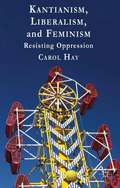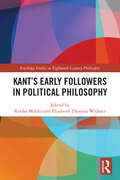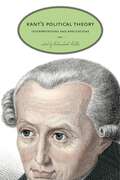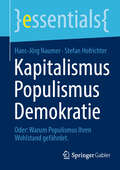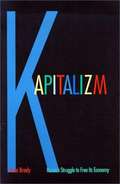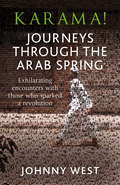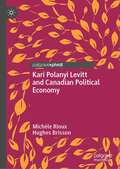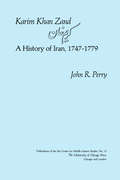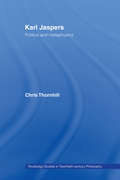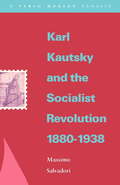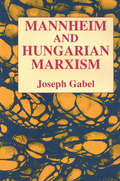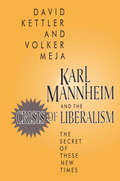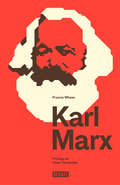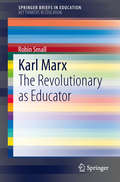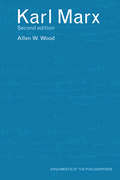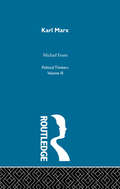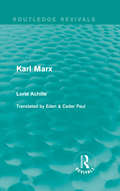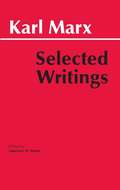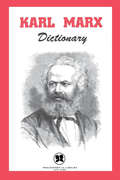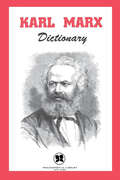- Table View
- List View
Kantianism, Liberalism, and Feminism
by Carol HayIn this book Hay argues that the moral and political frameworks of Kantianism and liberalism are indispensable for addressing the concerns of contemporary feminism. After defending the use of these frameworks for feminist purposes, Hay uses them to argue that people who are oppressed have an obligation to themselves to resist their own oppression.
Kant’s Early Followers in Political Philosophy (Routledge Studies in Eighteenth-Century Philosophy)
by Reidar Maliks Theresia Widmer, ElisabethImmanuel Kant influenced a large and productive group of political philosophers in the 1790s. This volume argues that they brought out more fully the egalitarian principles of Kantian republicanism.“The Kantian school” featured young philosophers including Saul Ascher, Johann Adam Bergk, Johann Benjamin Erhard, Johann Ludwig Ewald, the early Johann Gottlieb Fichte, Friedrich Schlegel, and Johann Heinrich Tieftrunk. The chapters in this volume analyze their work in relation to Kant and their wider philosophical and political context. They advance three main theses. First, the Kantians defended popular sovereignty and several of them supported the extension of the right to vote to workers and women. Second, several of them developed a political perfectionism, the view that equal political rights are justified for their effects on cultivating moral character. Third, they developed sophisticated theories of state legitimacy and collective action, defending a people’s right to change their constitution, either through reform or through revolution.Kant’s Early Followers in Political Philosophy offers a systematic view into a neglected group of thinkers at a foundational moment for modern political thought. It will be of interest to scholars and graduate students working on Kant, eighteenth- century philosophy, political philosophy, and the history of early modern German political thought.
Kant’s Political Theory: Interpretations and Applications
by Elisabeth EllisPast interpreters of Kant’s thought seldom viewed his writings on politics as having much importance, especially in comparison with his writings on ethics, which (along with his major works, such as the Critique of Pure Reason) received the lion’s share of attention. But in recent years a new generation of scholars has revived interest in what Kant had to say about politics. From a position of engagement with today’s most pressing questions, this volume of essays offers a comprehensive introduction to Kant’s often misunderstood political thought. Covering the full range of sources of Kant’s political theory—including not only the Doctrine of Right, the Critiques, and the political essays but also Kant’s lectures and minor writings—the volume’s distinguished contributors demonstrate that Kant’s philosophy offers compelling positions that continue to inspire the best thinking on politics today.Aside from the editor, the contributors are Michaele Ferguson, Louis-Philippe Hodgson, Ian Hunter, John Christian Laursen, Mika LaVaque-Manty, Onora O’Neill, Thomas W. Pogge, Arthur Ripstein, and Robert S. Taylor.
Kant’s Political Theory: Interpretations and Applications
by Elisabeth EllisPast interpreters of Kant’s thought seldom viewed his writings on politics as having much importance, especially in comparison with his writings on ethics, which (along with his major works, such as the Critique of Pure Reason) received the lion’s share of attention. But in recent years a new generation of scholars has revived interest in what Kant had to say about politics. From a position of engagement with today’s most pressing questions, this volume of essays offers a comprehensive introduction to Kant’s often misunderstood political thought. Covering the full range of sources of Kant’s political theory—including not only the Doctrine of Right, the Critiques, and the political essays but also Kant’s lectures and minor writings—the volume’s distinguished contributors demonstrate that Kant’s philosophy offers compelling positions that continue to inspire the best thinking on politics today.Aside from the editor, the contributors are Michaele Ferguson, Louis-Philippe Hodgson, Ian Hunter, John Christian Laursen, Mika LaVaque-Manty, Onora O’Neill, Thomas W. Pogge, Arthur Ripstein, and Robert S. Taylor.
Kapitalismus Populismus Demokratie: Oder: Warum Populismus Ihren Wohlstand gefährdet. (essentials)
by Hans-Jörg Naumer Stefan HofrichterDieses Essential untersucht Gründe für das Erstarken des Populismus weltweit aus vor allem ökonomischer Perspektive, und belegt welche Folgen populistische Regierungen für Wachstum, Wohlstand und Finanzmärkte haben. Dabei wird deutlich, dass der Populismus über Wachstumseinbußen schnell in einen Teufelskreis münden kann, der auch Kapitalerträge gefährdet. Der "populistische Teufelskreis" kann durchbrochen werden, indem dem Gespinst aus Fakenews, Abstiegssorgen und Verteilungskämpfen ökonomische Lösungen entgegengesetzt werden. Die Autoren spenden ihr Honorar an das Kinderhilfswerk „Die Arche&“. Der Inhalt Analyse des Populismus aus ökonomischer Perspektive Auswirkungen auf Wachstum, Wohlstand, Inflation und Kapitalanlage Lösungen, wie der „populistische Teufelskreis&“ durchbrochen werden kann
Kapitalizm: Russia's Struggle to Free Its Economy
by Rose BradyRose Brady, former Moscow bureau chief for Business Week magazine, here provides a compelling firsthand account of Russia's transition from a socialist state to a market economy. Taking us into the factories, stores, banks, markets, homes, schools, and corridors of power in Russia, she explains how the country's own brand of capitalism has evolved.
Karama!: Journeys Through the Arab Spring
by Johnny WestThe Arab Spring took all of us by surprise. The questions we all have are how can such leaderless revolts, so different from others in the past, have arisen, why there, and why now. Johnny West is the perfect guide on this quest. Returning to countries in which he had lived years before, he travels by bus and communal taxi through the back streets and small towns, sits in houses and cafés, in offices and barber shops, a fly-on-the-wall observer of encounters and arguments; he talks to students and managers, to protestors and their families, to oil workers and clerics, to people and in places where none of the media have been. Through all the conversations across Libya, Tunisia and Egypt, the author draws us into an exhilarating portrait of unforgettable characters of the Arab Spring and shares with us how they see their future.Karama: Journeys through the Arab Spring makes you feel you are there, in those dusty streets, and that you understand why those thousands and thousands created the uprising.
Karama. Las revueltas árabes (Colección Endebate #Volumen)
by Olga RodríguezEl pasado, el presente y el futuro de las revueltas árabes. Karama (dignidad) es el grito de los levantamientos árabes, unas revueltas que no han hecho más que empezar. La indignación y el deseo de libertad han superado el miedo de miles de personas que nada tienen que perder y han derribado regímenes que parecían eternos. Las protestas se alzan contra la pobreza, la falta de libertades y la colonización económica del primer mundo que, con su doble moral, por una parte fomenta el fundamentalismo mientras por otra lo combate públicamente y lo utiliza como salvoconducto para intervenir. Aunque las revueltas han pasado a un segundo plano en la prensa occidental, Olga Rodríguez explica los motivos de su apogeo, y cómo nada volverá a ser lo mismo en el mundo árabe.
Kari Polanyi Levitt and Canadian Political Economy
by Michèle Rioux Hughes BrissonThis book acts as a tribute to the legacy of the Canadian political economist Kari Polanyi Levitt, daughter of Karl Polanyi, one of the great economists of the 20th century. Polanyi Levitt’s life and work were devoted to understanding the scientific and political challenges that humanity faces and the incredible impacts of development, trade, and globalization in their diverse manifestations, including in the context of the current COVID-19 pandemic. This book reflects on Polanyi Levitt’s conviction that the solution to contemporary challenges lies not in the development of sophisticated technologies, but in questioning how we want to live with each other and working to re-embed the economy in the wider social system. Ultimately, the book contends that Polanyi Levitt’s message is simple: humanity must rethink the way we live in this world our place in the universe, and our relationship with nature. Drawing on a 10-year research project encompassing interviews and literature review, this short volume introduces and celebrates Kari Polanyi Levitt's legacy and invites political economists to engage with her work.
Karim Khan Zand
by John R. PerryA forward thinking and notably popular leader, Karim Khan Zand (1705-1779) was the founder of the Zand dynasty in Iran. In this insightful profile of a man before his time, esteemed academic John Perry shows how by opening up international trade, employing a fair fiscal system and showing respect for existing religious institutions, Karim Khan succeeded in creating a peaceful and prosperous state in a particularly turbulent epoch of history.
Karl Jaspers: Politics and Metaphysics (Routledge Studies in Twentieth-Century Philosophy #Vol. 11)
by Chris Thornhill Dr Chris ThornhillThis book sets out a new reading of the much-neglected philosophy of Karl Jaspers. By questioning the common perception of Jaspers either as a proponent of irrationalist cultural philosophy or as an early, peripheral disciple of Martin Heidegger, it re-establishes him as a central figure in modern European philosophy. Giving particular consideration to his position in epistemological, metaphysical and political debate, the author argues that Jaspers's work deserves renewed consideration in a number of important discussions, particularly in hermeneutics, anthropological reflections on religion, the critique of idealism, and debates on the end of metaphysics.
Karl Kautsky and the Socialist Revolution 1880-1938
by Massimo SalvadoriThis first modern study provides an original and balanced perspective of a theorist whom Lenin referred to as both 'master of Marxism' and 'renegade'. Examining Kautsky's political thought over a period stretching from the Paris Commune to the Second World War, the author argues for the consistency with which Kautsky developed his positions on socialism, democracy, political parties and the role of the proletariat. While Salvadori's analysis is grounded in the debates within the Communist International and the German labour movement, Kautsky emerges as a distinctly modern thinker who produced a Marxist theory of the state, and originated critique of the USSR as a 'state capitalist' system. At this level, it provides a serious and measured exposition of the terms on which arguments for socialist strategy currently move.
Karl Mannheim and Hungarian Marxism
by Joseph GabelThis remarkable work situates the great Karl Mannheim not only in the Austro-Hungarian empire, but in Hungary and especially in the intellectual fever pitch of pre-war Budapest, with its plethora of revisionist Marxists, anarchists, and intellectuals from a variety of areas who brought radical ideas into the mainstream of biological and social sciences. As Gabel reminds us, Budapest provided a special environment in which the cross-currents of Europe met, and was uniquely devoid of the xenophobia and militarism of so many other parts of Europe.The volume serves as a useful introduction to the force and character of Marxism in Central Europe. Gabel covers not only key figures but major concepts associated with Mannheim and the sociology of knowledge: ideology and false consciousness; the socially unattached intelligentsia; and the utopian conscience. In addition, we are given a tour of the work of Mannheim as seen in Germany, France and England. Gabel's has a unique mastery of the major languages of Europe, and this gives him the potential for a reinterpretation of Mannheim that reveals the author to be a talented thinker in his own right, and not simply a chronicler of the work of others. His final chapter on Mannheim, comparing him with Lukacs as well as Marx, is central to our understanding of sociology.In raising the importance of the role of consciousness in the study of society, Mannheim overcame what Marx and Engels, no less than many of his followers understood to be an essential weakness in the so-called economic interpretation of history. This book, linking Mannheim to the Hungarian climate, helps us appreciate how this sociological synthesis came about in a specific social setting.Joseph Gabel was born in Hungary, and educated in French universities. He is the author of False Consciousness (1962); Sociology of Alienation (1970); Ideologies, Vol. I (1974); Ideologies II (1978), all in French. His book on The Forms of Estrangement (1964) was published in German. His shorter articles have appeared in Kolner Zeitschrift for Soziologie und Sozial-psychologie, and the Newsletter of the International Society for the Sociology of Knowledge.
Karl Mannheim and the Crisis of Liberalism: The Secret of These New Times
by David KettlerTo reflect on Karl Mannheim is to address fundamental issues of political enlightenment Mannheim's driving determination "was to learn as a sociologist by close observation the secret (even if it is infernal) of these new times." Mannheim's aim was "to carry liberal values forward." His problem remains irresistible to reflective people at the end of the twentieth century. Mannheim attempted to link social thinking to political emancipation despite overwhelming evidence against the connection. Karl Mannheim and the Crisis of Liberalism is a sympathetic biography of Mannheim's paradoxicalaand paradigmatica'project. The book covers a wide range of European and American thought, including Mannheim's dealings with Georg Lukacs and Oscar Jszi in Budapest; with Alfred Weber, Leopold von Wiese, Franz Neumann, Paul Tillich, Adolph Loewe, and his students in Weimar Germany; with Louis Wirth, Edward Shils, and other major figures in American sociology; and with social analysts and religious thinkers in England. The analysis is informed by dilemmas of history and theory, science and rhetoric, freedom and technical controlathe themes of liberalism. Kettler and Meja carefully depict each stage of Mannheim's life as a sociologist and explore his influence on leading social thinkers. Karl Mannheim and the Crisis of Liberalism combines significant biographical information with insightful sociological theory. It will be a vital resource for historians, sociologists, and political theorists.
Karl Marx
by Allen W. WoodAllen Wood explains the views of Karl Marx from a philosophical standpoint and defends Marx against common misunderstandings and criticisms of his views. This second edition has been revised to include a new chapter on capitalist exploitation and new suggestions for further reading. Wood has also added a substantial new preface which looks at Marx's thought in light of the fall of the Soviet Union and our continued ambivalence towards capitalism, exploring Marx's continuing relevance in the twenty-first century.
Karl Marx
by Francis WheenLa biografía más humana, cercana y amena de uno de los filósofos más influyentes de todos los tiempos Las ideas de Karl Marx son probablemente las que más han influido en el mundo después de las de Jesucristo. En esta apasionante y en ocasiones muy divertida biografía se nos presenta por primera vez a Karl Marx en su faceta más humana. Un apasionado agitador, que pasó casi toda su vida encerrado en la sala de lectura del Museo Británico; un hombre sociable y simpático que, sin embargo, acabó enemistado con casi todos sus amigos; un abnegado padre de familia que dejó embarazada a la criada; un intelectual profundamente serio al que le gustaba beber, contar chistes y fumar puros y un hijo pródigo al que su madre le dijo: «Habría preferido que reunieras un capital en vez de escribir sobre él.» La vida y las ideas de Marx, su encanto y su cólera, se muestran en toda su complejidad y contradicción: la de un brillante y provocador filósofo que vivió, como en los libros de Dickens, los tiempos difíciles de un caballero venido a menos. Otros escritores y periodistas opinan...«Leería cualquier cosa escrita por Wheen, incluso una biografía de Marx.»Nick Hornby «Este libro es una delicia.»Niall Ferguson «Un libro magnífico, divertido y fascinante, un triunfo de Wheen.»A.N.Wilson
Karl Marx
by Gareth Stedman JonesGareth Stedman Jones returns Karl Marx to his nineteenth-century world, before later inventions transformed him into Communism's patriarch and fierce lawgiver. He shows how Marx adapted the philosophies of Kant, Hegel, Feuerbach, and others into ideas that would have--in ways inconceivable to Marx--an overwhelming impact in the twentieth century.
Karl Marx
by Robin SmallThis book is an introduction to Karl Marx (1818-1883) as a radical educational thinker. Marx's own schooling and education are examined and we see how his interest in educational issues was informed by his own experience. Educational themes in Marx's thinking are identified: the role of education within capitalist society, the contribution of education to human development and the character of education in a future society. These are placed in a historical setting by the author and related to public debates over educational policy. Throughout his career, Marx identified education as key to the prospects of the working class. The story of this engagement adds a new dimension to the picture of his work as a philosopher, political economist and socialist revolutionary. The aspects of education that concerned Marx matched prominent features of his theoretical and political activity, and educational themes provided him with a critical application for many of his most important ideas. The author explores Marx's work on the British factory school system, his use of evidence from the reports of school inspectors, and the contemporary movement that led to the establishment of modern systems of public schooling. The final chapter relates Marx's thinking to questions about the place of education in today's society, showing how relevant it is for the twenty-first century. These discussions contain new scholarship, draw on original sources and are written in a clear and readable style. Students in education courses at universities and colleges, educational researchers and teachers will find this examination of Karl Marx's ideas concerning education both engaging and enlightening.
Karl Marx (Arguments of the Philosophers)
by Allen WoodThis is one of the most respected books on Marx's philosophical thought. Wood explains Marx's views from a philosophical standpoint and defends him against common misunderstandings and criticisms. All the major philosophical topics in Marx's work are considered: the central concept of alienation; historical materialism and Marx's account of social classes; the nature and social function of morality; philosophical materialism and Marx's atheism; and Marx's use of the Hegelian dialectical method and the Marxian theory of value.
Karl Marx (Arguments of the Philosophers)
by Wood AllenThis is one of the most respected books on Marx's philosophical thought. Wood explains Marx's views from a philosophical standpoint and defends Marx against common misunderstandings and criticisms of his views. All the major philosophical topics in Marx's work are considered: the central concept of alienation; historical materialism and Marx's account of social classes; the nature and social function of morality; philosophical materialism and Marx's atheism; and Marx's use of the Hegelian dialectical method and the Marxian theory of value.The second edition has been revised to include a new chapter on capitalist exploitation and new suggestions for further reading. Wood has also added a substantial new preface which looks at Marx's thought in light of the fall of the Soviet Union and our continued ambivalence towards capitalism, exploring Marx's continuing relevance in the twenty-first century.
Karl Marx (Political Thinkers Ser. #No. 3)
by Michael EvansFirst published in 1975, this book provides an interpretative introduction to the political thought of Karl Marx. The approach is both historical and analytical, with emphasis placed on developments and changes in Marx's thought. The book is firmly based on a close reading of primary sources including recently discovered documents on the Communist League, the drafts of Marx's Civil War in France and the Grundrisse manuscripts.
Karl Marx (Routledge Revivals)
by Loria AchilleAchille Loria was a well-known Italian political economist and this translation of his work presents his views and discussions on famous socialist Karl Marx, bringing his work to an English audience. Originally published in 1917, the translators have included a detailed foreword which attempts to put Loria’s work in context of other views on Marxism. This title will be of interest to students of politics and sociology.
Karl Marx - Selected Writings
by Karl Marx Lawrence H. SimonFeaturing the most important and enduring works from Marx's enormous corpus, this collection ranges from the Hegelian idealism of his youth to the mature socialism of his later works. Organized both topically and in rough chronological order, the selections (many of them in the translations of Loyd D. Easton and Kurt H. Guddat) include writings on historical materialism, excerpts from Capital, and political works.
Karl Marx Dictionary
by Morris StockhammerKarl Marx Dictionary is another in a series of dictionary-type books that cover the works of thinkers of historical significance. The captivating and detailed entries of this volume, put forward in clearly understandable terms, extract the essential ideals of Marx from his voluminous and historically important works. The main source of Marxian doctrine is found, of course, in the three volumes of Das Kapital; every significant and definitive passage from this masterwork is isolated for reference and scrutiny. In addition, many other sources from the vast body of Marx's writings are exploited. The user of this volume can learn practically all there is to know of the philosophy of Marxism.
Karl Marx Dictionary
by Morris StockhammerThis accessible and comprehensive reference volume covers the concepts, terminology, and writings of the towering political philosopher. The detailed, authoritative entries of this volume, written in clearly understandable terms, extract the essential ideas from Karl Marx&’s voluminous and historically important works. As the three volumes of Das Kapital are the main source of Marxist thought, every significant passage from this masterwork is isolated for reference and scrutiny. In addition, many other sources from the vast body of Marx&’s writings are closely examined. With its expertly researched, in-depth entries, this volume presents a complete account of Marx&’s philosophy.
